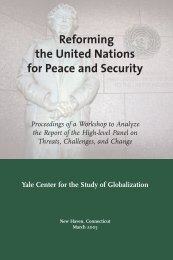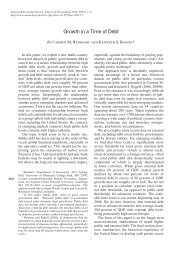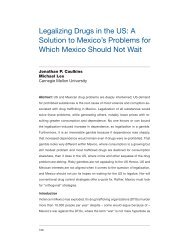The collapse of global trade, murky protectionism, and the crisis:
The collapse of global trade, murky protectionism, and the crisis:
The collapse of global trade, murky protectionism, and the crisis:
Create successful ePaper yourself
Turn your PDF publications into a flip-book with our unique Google optimized e-Paper software.
16. Bailouts: how to discourage a subsidies<br />
war<br />
Simon J. Evenett <strong>and</strong> Frédéric Jenny<br />
University <strong>of</strong> St Gallen <strong>and</strong> CEPR; ESSEC <strong>and</strong> Cour de<br />
Cassation<br />
During <strong>the</strong> current <strong>global</strong> economic <strong>crisis</strong> many governments in industrialised countries<br />
have shied away from blatant protectionist measures, such as raising tariffs <strong>and</strong><br />
imposing quotas, <strong>and</strong> have instead <strong>of</strong>fered "bailout" packages involving considerable<br />
sums <strong>of</strong> state funds <strong>and</strong> guarantees to <strong>the</strong> banking, insurance, <strong>and</strong> automobile sectors,<br />
to name a few. In part, this reflects <strong>the</strong> drying up <strong>of</strong> credit <strong>of</strong>fered by traditional<br />
financial intermediaries to each o<strong>the</strong>r <strong>and</strong> to <strong>the</strong> rest <strong>of</strong> <strong>the</strong> private sector. As <strong>the</strong><br />
<strong>crisis</strong> has deepened, however, <strong>the</strong> rationale for <strong>the</strong>se bailouts has shifted from <strong>the</strong><br />
preservation <strong>of</strong> <strong>the</strong> payments system (an economy-wide matter) to sectoral initiatives<br />
targeting jobs loss <strong>and</strong> <strong>the</strong> viability <strong>of</strong> selected firms. Doubt is cast here on <strong>the</strong> wisdom<br />
<strong>of</strong> this shift, especially as <strong>the</strong> discriminatory impact (if not intent) <strong>of</strong> <strong>the</strong>se<br />
bailouts could trigger a wasteful subsidies war between governments.<br />
<strong>The</strong> systemic purpose <strong>of</strong> <strong>the</strong> initial bailouts<br />
In <strong>the</strong> past 12 months bailouts have implemented for two reasons. First, <strong>the</strong> sheer<br />
magnitude <strong>of</strong> <strong>the</strong> total losses from holding mortgage-backed assets (estimated to be<br />
<strong>of</strong> <strong>the</strong> order <strong>of</strong> five trillion dollars) <strong>and</strong> o<strong>the</strong>r financial instruments has created concerns<br />
about counter-party repayment risk <strong>and</strong> bank insolvency. So as to prevent runs<br />
by bank depositors, that could ultimately jeopardise <strong>the</strong> viability <strong>of</strong> <strong>the</strong> national payment<br />
systems upon which monetary economies survive, a compelling case was made<br />
for <strong>of</strong>fering financial support to banks.<br />
Second, <strong>the</strong> destruction <strong>of</strong> wealth in <strong>the</strong> financial sector has also hurt <strong>the</strong> real<br />
economy. <strong>The</strong> decrease in stock values <strong>and</strong> falling house prices have reduced expenditures<br />
by investors <strong>and</strong> retirees who live <strong>of</strong>f <strong>the</strong>ir stock <strong>and</strong> bond portfolios. Banks<br />
with weak balance sheets <strong>and</strong> financial institutions have less working capital to lend.<br />
This fur<strong>the</strong>r affected <strong>the</strong> real economy by reducing consumer purchases <strong>of</strong> goods <strong>and</strong><br />
services, <strong>and</strong> investments by firms that use credit to finance <strong>the</strong>ir expansions.<br />
Fur<strong>the</strong>rmore, increased uncertainty about <strong>the</strong> future (in particular concerning <strong>the</strong><br />
prospect <strong>of</strong> being unemployed) generated a fall in spending for risk-averse consumers<br />
<strong>and</strong> investors. Taken toge<strong>the</strong>r <strong>the</strong>se effects have systemic implications. Many firms<br />
have found <strong>the</strong>mselves facing a double squeeze; on <strong>the</strong>ir sales <strong>and</strong> on sources <strong>of</strong> working<br />
capital. Consequently, pressures to lay-<strong>of</strong>f employees <strong>and</strong> cut investment levels<br />
have intensified. In <strong>the</strong>se circumstances governments cannot be realistically expected<br />
to confine bailouts to <strong>the</strong> banks when o<strong>the</strong>r large firms face bankruptcy <strong>and</strong> unemployment<br />
queues leng<strong>the</strong>n.<br />
So it came to pass that governments, through separate interventions <strong>and</strong> in stimulus<br />
packages, have <strong>of</strong>fered subsidies to banks <strong>and</strong> commercial firms. <strong>The</strong>se subsidies<br />
have taken many forms. For example, some have consisted <strong>of</strong> direct payments to<br />
81





